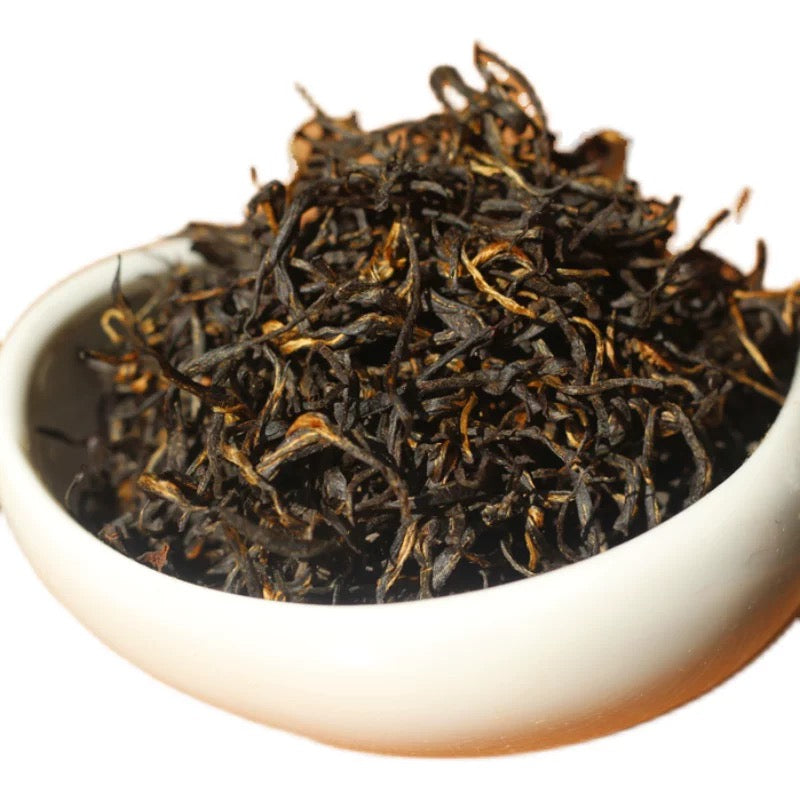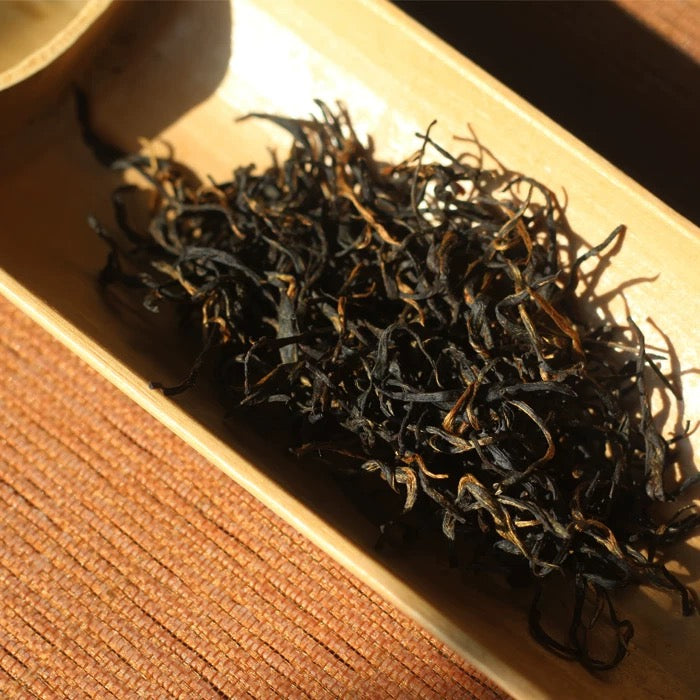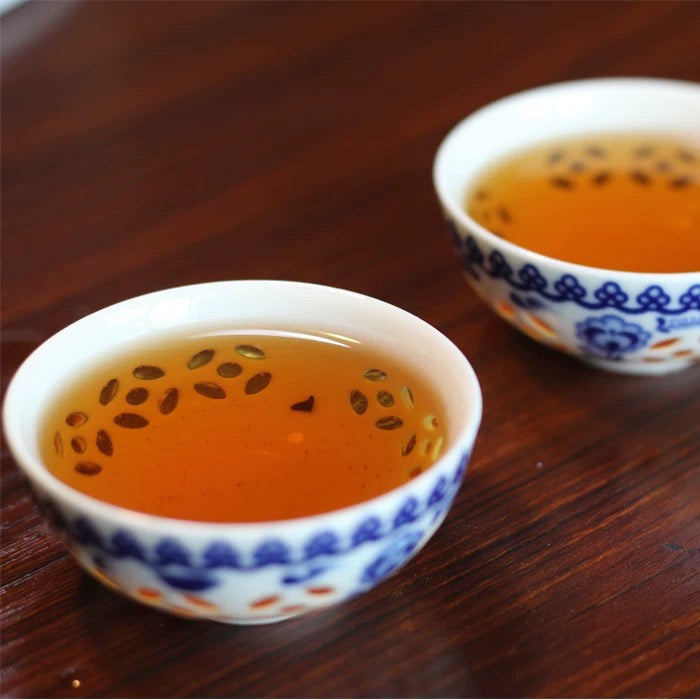YUYUN
Anhua smoked black tea
Anhua smoked black tea
Samples are not for sale but can be given away
Samples are not for sale but can be given away
Couldn't load pickup availability
Anhua smoked black tea: The "Huhong" Treasure of Chinese Tea Culture
Nestled in the mist-shrouded mountains of Anhua County, Yiyang City, Hunan Province, lies Anhua Black Tea—a gem of Chinese tea culture celebrated for its robust "red soup and red leaves," aromatic depth, and profound historical legacy. As a representative of Huhong (Lake Red Tea), Anhua Black Tea stands alongside Anhui's Qihong and Fujian's Jianhong as one of China's three authentic black teas. With a history spanning over 1,300 years, it has captivated tea enthusiasts worldwide and earned accolades such as the 1915 Panama-Pacific International Exposition Gold Medal. Today, it is not only a pride of Hunan but also a living testament to China's traditional tea craftsmanship.
Historical Roots: From Local Legend to Global Acclaim
Anhua Black Tea's origins trace back to the Tang Dynasty (618–907 CE), with records of "Qujiang Bupian" tea as a tribute to the imperial court. By the Ming and Qing Dynasties, its unique post-fermentation and pine-smoke curing techniques were perfected, creating its iconic smoky aroma. During the Qing Xianfeng era (1854), Cantonese merchants introduced black tea production methods to Anhua, blending local tea varieties to create "Huhong"—a tea so coveted that merchants often passed it off as Fujian's Wuyi tea to command higher prices
By the early 20th century, Anhua Black Tea dominated 12.1% of China's tea exports, shipping to Russia, Britain, and the U.S. Its golden era peaked in 1915 when it shared the stage with Moutai liquor at the Panama-Pacific Expo. Today, it holds National Geographical Indication certification and boasts a brand value of **¥6.175 billion (2023)**, ranking sixth nationally and first in Hunan
Artisanal Craftsmanship: Fermentation and Tradition
Anhua Black Tea's distinctiveness lies in its seven-step process:
- Withering: Fresh leaves are air-dried to reduce moisture by 60–70%, activating enzymatic activity.
- Rolling: Leaves are mechanically rolled to release juices and form tight, twisted shapes.
- Piling (Wet Fermentation): Heaped for 48–72 hours at 25–28°C, allowing microbial action to convert polyphenols into theaflavins and thearubigins—compounds responsible for its deep color and mellow flavor
- Drying: Slow baking at 50–60°C locks in flavors and adds a subtle smokiness from pine fires.
- Sizing: Leaves are sorted by size to ensure uniformity.
- Aging: Some batches undergo 3–6 months of natural aging to develop complexity.
- Compression: For premium varieties like Qianliang Tea, leaves are pressed into dense cakes using bamboo molds—a technique listed as a National Intangible Cultural Heritage
Sensory Journey: A Symphony of Flavors
- Appearance: Tightly rolled, jet-black leaves with golden tips resembling "sparrow tongues."
- Liquor: Crimson-red, transparent as gemstone, deepening to amber with age.
- Aroma: Initial smokiness evolves into layers of dried longan, orchid, and toasted nuts, lingering on the palate.
- Taste: Rich and smooth, balancing umami sweetness with a clean, mineral finish.
Health Benefits: Nature's Elixir
Anhua Black Tea is a powerhouse of wellness:
- Antioxidants: High levels of polyphenols combat free radicals, slowing cellular aging
- Metabolic Support: Thearubigins and selenium aid in glucose regulation and lipid metabolism.
- Cardiovascular Health: Catechins improve blood vessel elasticity and reduce cholesterol.
- Digestive Aid: Improves gut flora balance and alleviates bloating.
Brewing Ritual: Unleashing its Essence
- Water: 95–100°C boiling water to extract full-bodied flavors.
- Teaware: Purple clay pots or gaiwans for heat retention.
- Ratio: 3g tea leaves per 150ml water.
- Steeping: 3–5 minutes initially; extend by 10 seconds per subsequent infusion.
Cultural Legacy: From Border Trade to Modern Icon
- Trade History: During the Qing Dynasty, Anhua's 300+ tea houses supplied 12.1% of China's black tea exports, fueling the Ancient Tea Horse Road economy
- Innovations: The Qianliang Tea (1,000-li Tea), a 36kg compressed cylinder, revolutionized long-distance transport and preservation.
- Modern Recognition: Featured in the 2010 Shanghai Expo and awarded "China's Famous Tea" in 1959, it remains a favorite for diplomatic gifts.
Why Choose Anhua Black Tea?
- Premium Sourcing: Grown at 600–800m altitude in Anhua’s red soil, rich in selenium and organic matter.
- Handcrafted Excellence: Master artisans reject mechanization, ensuring each batch reflects traditional rigor.
- Cultural Depth: Every sip connects to Hunan’s tea heritage and the resilience of borderland communities.
Savor the Essence of Time
From imperial tributes to UNESCO-recognized traditions, Anhua Black Tea transcends time. Let its smoky embrace transport you to the misty valleys of Hunan—a journey where history, art, and nature converge.






